Graduation review - 'Cannes winner is a bleak Romanian masterpiece'
Cristian Mungiu delivers another dark despatch from home
A decade ago Romanian director Cristian Mungiu took the Palme d’Or at Cannes for 4 Months, 3 Weeks and 2 Days, a gruelling abortion drama set in the dying days of the Ceauşescu dictatorship. The cold intensity of that film made it a key work in the remarkable movement that came to be known as the Romanian New Wave, which directed a pitiless eye at the reality of the country as it struggled to throw off the burden of decades of Communism.
Back at Cannes last year with his new film Graduation (Bacalaureat), Mungiu won the Best Director award. Graduation is set in the present day – even if not much has changed in the bleakly monotone world Mungiu depicts, mobile phones excepted – and allows us to guess at the director’s verdict on the intervening period. It’s a far from optimistic prognosis: his experience has made him sad.
To say that there is little new in Mungiu’s world is to highlight its sotto voce tragedy
At least that is the impression we receive from the hero of his film. Romeo Altea (Adrian Titieni) is a middle-aged hospital physician, tired beyond his years, brought down by the everyday business of living. He is in a relationship with a younger woman but struggles to end his unhappy marriage to wife Magda (Lia Bugnar), who looks like a catatonic wraith (Adrian Titieni with Lia Bugnar, pictured below). The only beacon of hope – clearly one Romeo has been tending for years – is their daughter Eliza (Maria Drăguş).
She is the apple of the family eye, and her father is almost over-protective of her. Now on the cusp of independence, Eliza has won a scholarship to study in the UK (Cambridge, no less), which will realise her parents’ dreams about her finding a place in a better world, and leaving the dour reality of her homeland behind forever.
All that remains is for her to get the necessary grades at her school exams, which should be a formality. But cruel circumstance – I’m not sure if in Mungiu’s world that’s exactly the same thing as “fate” – intervenes. The day before, she’s attacked outside school and narrowly avoids being raped. Badly shaken, her right arm in plaster, her future suddenly looks less assured: the shock may cause her to fail the tests. Her father is distraught – he didn’t drop her off in the usual place, and in some way feels partly responsible – and will resort to anything to assure his daughter’s future.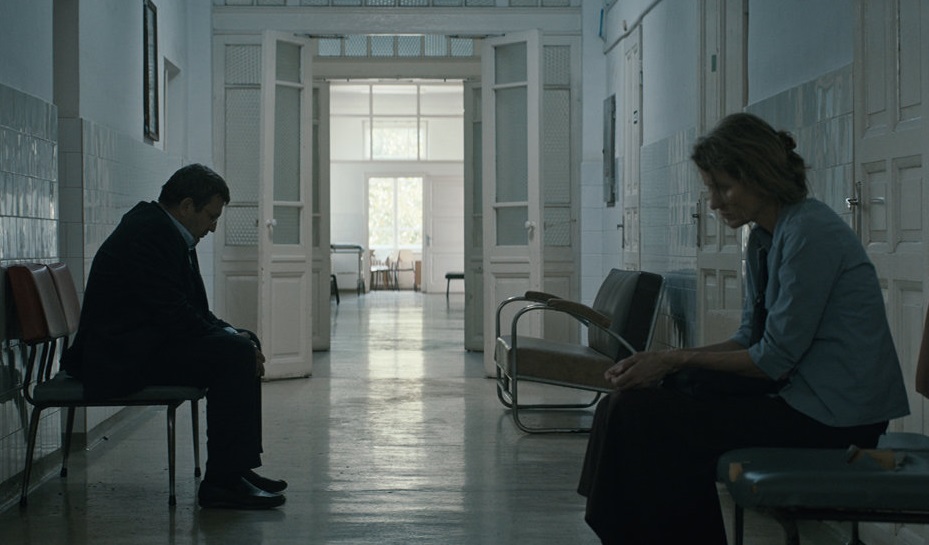 That means resorting to all the ruses of corruption offered by the world in which he lives; given his position as a doctor, they are plentiful. He’s close friends anyway with the police inspector investigating the case, which offers a natural referral to the deputy mayor – he’s in urgent need of an operation – who in turn is owed a favour by the school’s headmaster (so persuading the examiners shouldn't be a problem).
That means resorting to all the ruses of corruption offered by the world in which he lives; given his position as a doctor, they are plentiful. He’s close friends anyway with the police inspector investigating the case, which offers a natural referral to the deputy mayor – he’s in urgent need of an operation – who in turn is owed a favour by the school’s headmaster (so persuading the examiners shouldn't be a problem).
But Altea faces an inexorable choice. By going down that route, relying on such connections (and involving his daughter in the process), he’s negating all the values he has instilled in Eliza. There’s double cruelty in the fact that there is no other way out: the scholarship just can’t be held over, regardless of what has happened. And double irony given that such string-pulling was the natural way in the old, communist order, when you battled the system – it was how the doctor himself escaped military service in his youth, we learn. Now, even without any money changing hands, it’s the kind of corruption that the regime has set out to eradicate (recent street protests in Romania remind us how real such concerns are there). As the immediate ramifications of Eliza’s exams gain wider prominence, even the anti-corruption investigators admit to Altea that he isn’t really their target (they are the first to admit that as a doctor he doesn’t take bribes, or “incentives” as they are referred to at one point).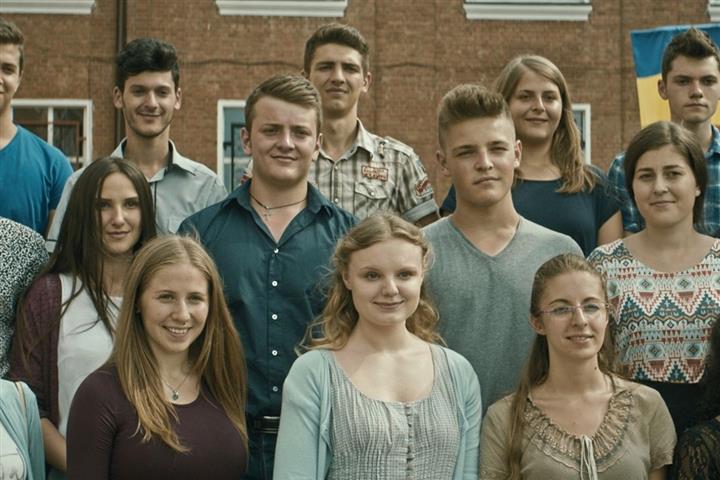 It’s a deeply forlorn canvas, as if Mungiu, a generation after 4 Months, 3 Weeks and 2 Days, confirms that his protagonists just can’t escape the rites and habits of the world that formed them. It achieves extra poignancy when Romeo and Magda remember how they returned home – we presume, from abroad – in 1991, the year in which Romania received its new constitution, with a conviction that they could contribute to building a new way of life in their homeland (“we thought we’d move mountains”).
It’s a deeply forlorn canvas, as if Mungiu, a generation after 4 Months, 3 Weeks and 2 Days, confirms that his protagonists just can’t escape the rites and habits of the world that formed them. It achieves extra poignancy when Romeo and Magda remember how they returned home – we presume, from abroad – in 1991, the year in which Romania received its new constitution, with a conviction that they could contribute to building a new way of life in their homeland (“we thought we’d move mountains”).
That idealism may have long disappeared, but at least their conviction that something different was available to Eliza elsewhere remained (even if their faith in Britain as such an ideal world seems a tad naïve). That disillusionment, somehow intricately connected to middle age, is compounded by Romeo’s shattering, yet somehow unacknowledged sadness that he must leave his marriage behind. His wife knows all about Sandra (Malina Manovici), the younger woman with whom he has found some new happiness, but has herself chosen to postpone any resolution of that question until after their daughter’s departure.
To say that there is little new in Mungiu’s world is to highlight its sotto voce tragedy. Graduation is his first film with cinematographer Tudor Vladimir Panduru, but the muted colours look familiar, as are the depressing exteriors of a world that is somehow untended (the film’s opening shot shows a dug-up street: we wonder whether Mungiu is preparing to delve deeper into his world, or has already dug its grave). The director adheres to his past credo of using music only when it is actually playing on radio or CD, his chosen register the luminous melancholy of the countertenor repertoire, devastatingly expressive when we encounter it in Handel’s “Ombra mai fù” or Purcell’s “Cold Song” (a Mungiu title, if ever there was one).
And yet… Eliza may yet confound her parents’ expectations (and fears). The final graduation photograph shows a bunch of young people not so different from any other (pictured, above: Eliza, below centre): the director even allows a popular Romanian song to accompany his closing titles. The playing throughout is superb, which speaks for so much in itself: Graduation has a paradoxical poise in its execution that just can’t be entirely groundless. If Mungiu’s tool, like that of his medical hero, is a scalpel, hope remains that the operation may not prove in vain. But what a gruelling journey.
Overleaf: watch the trailer for Graduation

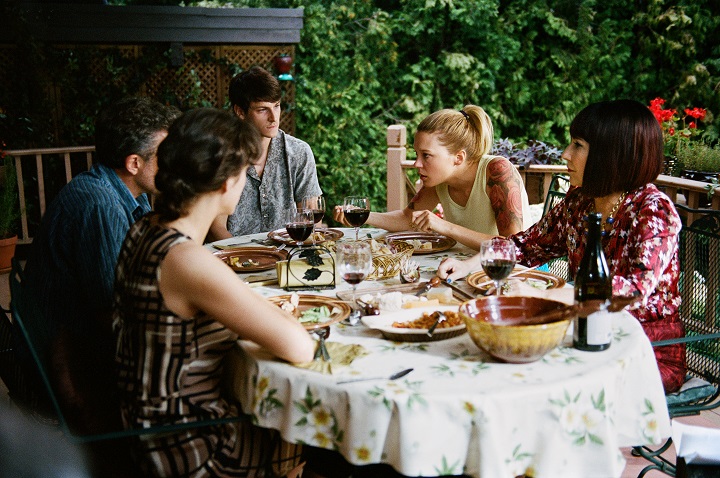 That means he hardly knows his younger sister Suzanne (Léa Seydoux) at all, and is meeting sister-in-law Catherine (Marion Cotillard) for the first time, though she and her husband Antoine (Vincent Cassel) have named one of their children after him. These two female characters are the ones that come closest to him: Cotillard’s character is especially sensitive, as she instinctively understands the issue – even if her words “Combien de temps?” lose much of their acuity in translation – that does finally remain unspoken.
That means he hardly knows his younger sister Suzanne (Léa Seydoux) at all, and is meeting sister-in-law Catherine (Marion Cotillard) for the first time, though she and her husband Antoine (Vincent Cassel) have named one of their children after him. These two female characters are the ones that come closest to him: Cotillard’s character is especially sensitive, as she instinctively understands the issue – even if her words “Combien de temps?” lose much of their acuity in translation – that does finally remain unspoken.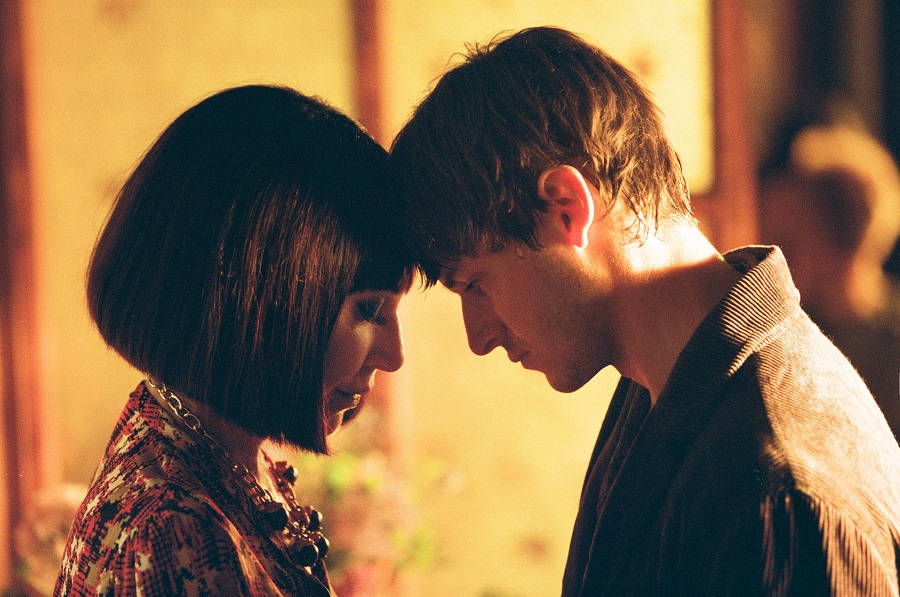 Nathalie Baye plays Martine, the matriarch. Though it’s the entire family that is on the edge of a nervous breakdown, we certainly sense where it came from. Dolan has a record of harping on mothers – his debut film was titled I Killed My Mother, his most recent one just Mommy – but actually that isn’t the dominating relationship here, rather it’s the whole entity that is under cruel scrutiny. (Nathalie Baye with Gaspard Ulliel, pictured above right.)
Nathalie Baye plays Martine, the matriarch. Though it’s the entire family that is on the edge of a nervous breakdown, we certainly sense where it came from. Dolan has a record of harping on mothers – his debut film was titled I Killed My Mother, his most recent one just Mommy – but actually that isn’t the dominating relationship here, rather it’s the whole entity that is under cruel scrutiny. (Nathalie Baye with Gaspard Ulliel, pictured above right.)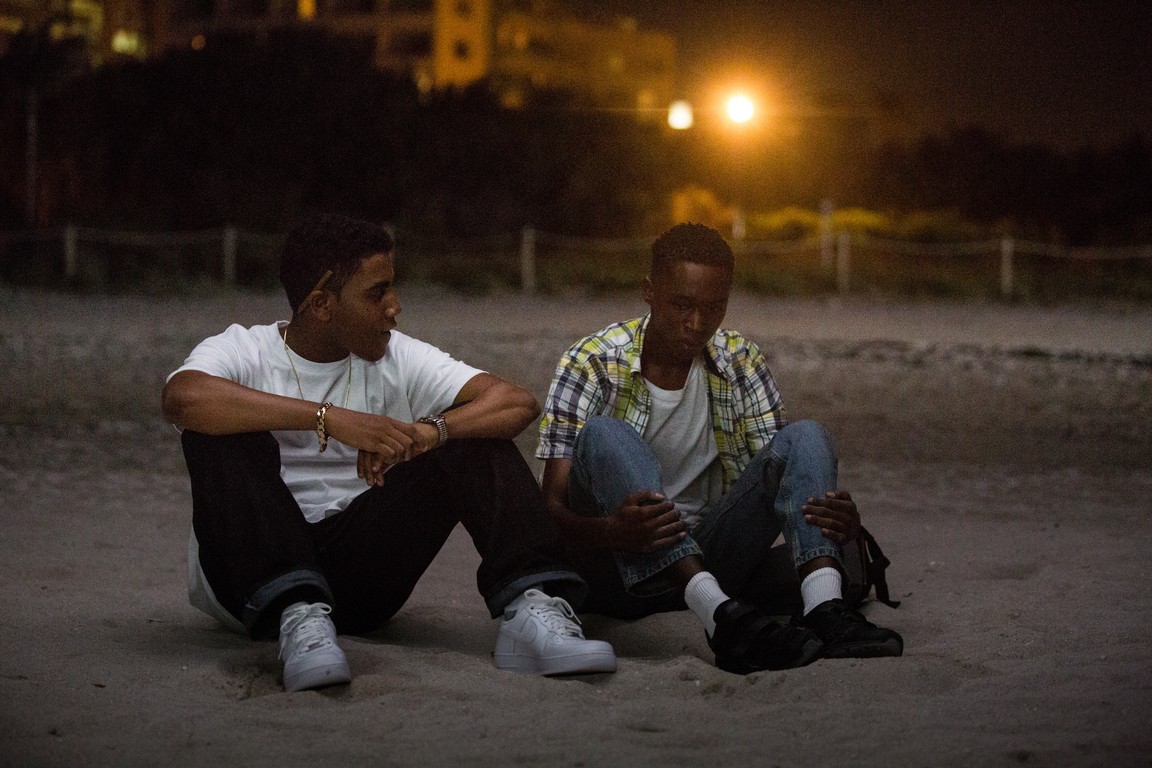 It’s not only physical slightness that sets Chiron apart: he’s treated as an outsider by his more aggressive contemporaries for another reason, one which they sense but he himself has not yet registered. The film opens with the latest of what we guess is a series of rejections, but this one ends on a more positive note with Little befriended by Juan (Mahershala Ali). Of Cuban descent, Juan may be a community hard man and drug dealer, but he shows only kindness to this resolutely silent youngster, first feeding him and then taking him home to his girlfriend Teresa (Janelle Monáe).
It’s not only physical slightness that sets Chiron apart: he’s treated as an outsider by his more aggressive contemporaries for another reason, one which they sense but he himself has not yet registered. The film opens with the latest of what we guess is a series of rejections, but this one ends on a more positive note with Little befriended by Juan (Mahershala Ali). Of Cuban descent, Juan may be a community hard man and drug dealer, but he shows only kindness to this resolutely silent youngster, first feeding him and then taking him home to his girlfriend Teresa (Janelle Monáe).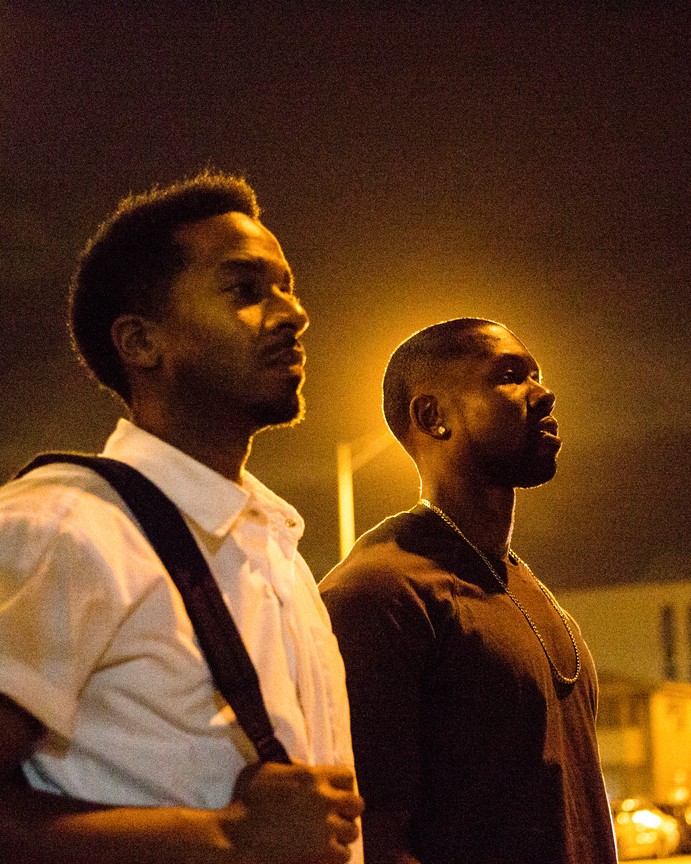 The defining moment of the succeeding section also takes place at the sea, as Chiron and Kevin talk on the beach (pictured above, Jharrel Jerome, left, with Ashton Sanders): Chiron once more risks trust, relaxing the barriers of self-protection that he has constructed around himself (“I cry so much sometimes I might turn to drops”, he poignantly reveals). The cruelty is that hurt will again follow revelation, culminating in an act of self-assertion that will change the course of the young man’s life, sending him away from his home environment.
The defining moment of the succeeding section also takes place at the sea, as Chiron and Kevin talk on the beach (pictured above, Jharrel Jerome, left, with Ashton Sanders): Chiron once more risks trust, relaxing the barriers of self-protection that he has constructed around himself (“I cry so much sometimes I might turn to drops”, he poignantly reveals). The cruelty is that hurt will again follow revelation, culminating in an act of self-assertion that will change the course of the young man’s life, sending him away from his home environment.